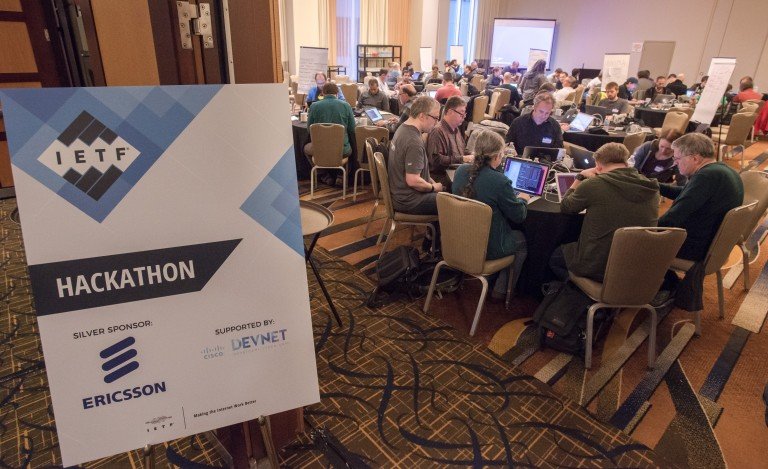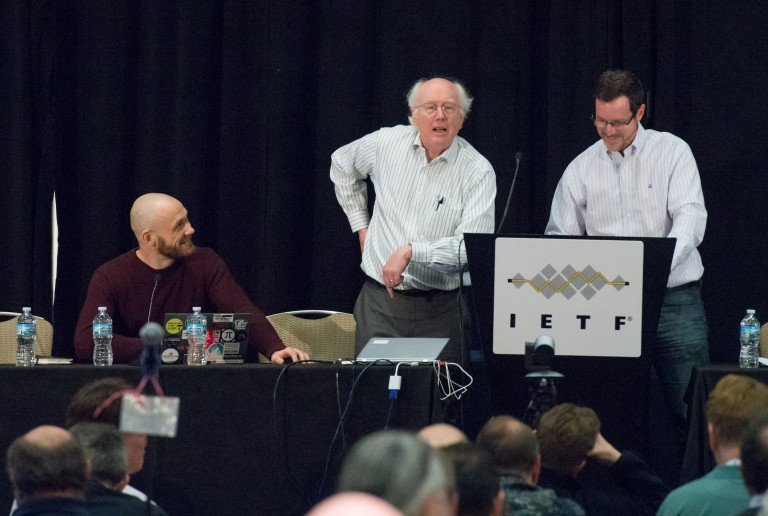Filter by topic and date
Highlights from IETF 98
- Alissa Cooper IETF Chair
6 Apr 2017
The 98th IETF meeting wrapped up last Friday in Chicago. It was a typically busy work week for IETF participants, but also a special week, as a number of changes in our leadership became official.
We welcomed newly selected individuals into the leadership and gave our thanks to outgoing members of the IESG, IAB, and IAOC, including the outgoing IETF Chair, Jari Arkko. Among his many other accomplishments, it was under Jari’s leadership that this blog came into existence. The blog has proven to be a useful tool for communicating with the IETF community and the world at large, and I intend to keep up the tradition. Same goes for video – you can see a clip of Jari and I recapping the meeting week here:
Amidst all the working group action and leadership transition activities, a few highlights stood out for me last week. Among more than 1000 attendees, nearly 17% were attending their very first IETF meeting this time around. We’re constantly evaluating what more we can do to attract cutting edge standardization work and new participants to the IETF, so it was nice to see many fresh faces.
Last week’s meeting demonstrated that a number of core security and web application standards are on a path towards high levels of maturity and industry adoption. These include:
- Transport Layer Security (TLS) version 1.3, a significant performance and security upgrade to the current version of TLS,
- the Automated Certificate Management Environment (ACME) protocol specification, which has provided the foundation for certificate management automation for the web, and
- the core Real-Time Communication in Web Browsers (RTCWEB) specifications, which together allow for standardized interactive communication using audio, video, and data connections between web browsers.
The work on all of these standards is heading towards conclusion within the respective working groups, and will soon be put out for IETF community review. There was also a large TLS team at the IETF Hackathon representing 18 independent implementations, and they were named the overall Hackathon winners by the judges. Congratulations!

Last week was also very busy for those working on YANG data models related to both network management and routing. While participants continue to press forward with the standardization of hundreds of different YANG modules in the IETF, they’ve also been focusing on guidelines and tooling (yangcatalog.org, for example) to help streamline the model development process and aid interoperability.
Our technical plenary speakers, Niels ten Oever and David Clark, addressed questions about the relationship between internet protocols and human rights. David encouraged us to think of standardization activities as “designing the playing field” and to contemplate how we “tilt the playing field” based on the design choices that we make. As expected, the topic yielded a provocative community discussion session.

We owe deep thanks to our meeting host, Ericsson, for stepping up to ensure the success of last week’s meeting. As an IETF Global Host, Ericsson has committed to host three IETF meetings in a 10-year period and affirmed its long-standing support for the work of the IETF. We heard at the plenary session just how important IETF work is to Ericsson’s industry and technology goals, particularly as the coming shift towards 5G inspires potential new requirements around packet transport, network and service management, and virtualization.
Until we gather again as a group for IETF 99 in July, work will continue as always on mailing lists, at interim meetings, and increasingly on Github (check out the Working Groups Using Github session for more on that). See you in all of those places …